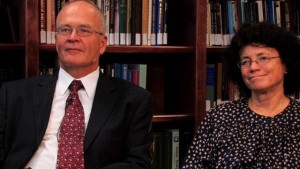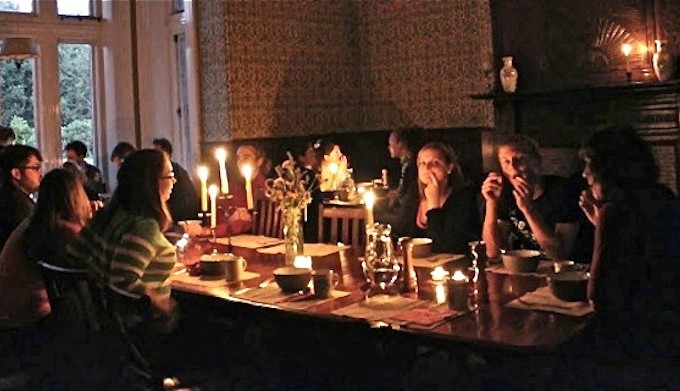Today many university students put subjectivity over objectivity, feelings over the pursuit of truth. We have written on this phenomenon in the post “Safe Spaces”: Converting Students to Jihadis on University Campuses. Maybe instead of simply critiquing this trend, we should provide an alternative. How about “growth spaces” of intellectual hospitality?
A few weeks ago, in a phone conversation with some friends and colleagues, someone used the phrase intellectual hospitality. I know the meaning of both words, but never in my life had I heard them put together. But I immediately thought of L’Abri Fellowship.
My wife and I had the privilege of studying, living, and working at L’Abri Fellowship in Switzerland back in the early 1970s. Intellectual hospitality is an apt way to capture what we experienced there.
 Both Francis and Edith Schaeffer, and our hosts Udo and Deborah Middelmann, opened their homes and lives to us. They provided a living model of intellectual hospitality.
Both Francis and Edith Schaeffer, and our hosts Udo and Deborah Middelmann, opened their homes and lives to us. They provided a living model of intellectual hospitality.
After spending many years in a stiffening anti-intellectual environment (an evangelical seminary), I experienced an intellectual openness at L’Abri I had never sensed before. People were open to my questions about the relevance of Christianity to poverty. Leaders were happy to discuss ideas and answer questions from people from all over the world. What we experienced was intellectual hospitality.
Hospitality is a critical virtue of the Christian faith. But hospitality is not simply the more modern concept of “entertaining” friends. Rather it is the art of befriending strangers. The letter to Hebrews captures the need, “Do not neglect to show hospitality to strangers, for thereby some have entertained angels unawares,” 13:2. The Greek word found here is interesting. It is φιλοξενία (philoxenia), composed of two words, philo – friend, “one who associates familiarly,” and xenos – stranger, foreigner. These two terms combine to say “hospitality,” i.e. showing care to strangers.
It is profoundly interesting and significant that hospitality – philoxenia – is the counterpoint to a dominant term in today’s culture, i.e. xenophobia, “the fear of that which is perceived to be foreign or strange.” This term is especially applied to fear of people from other countries and cultures. The word is very common today and is often synonymous with nationalism, racism, isolationism, bigotry, etc. Obviously, both words are built on the same root, xenos – stranger or foreigner.
What is different is the affix (prefix/suffix) used with xenos. The prefix, philo, indicates “friend,” while the suffix, phobos, denotes “fear.” Too often, people are afraid of others who are different from themselves. They want to live and function from “safe spaces” where they can be “comfortable” and safe from differing ideas and perspectives – spaces of intellectual fear. The Bible calls us to create spaces for hospitality, including intellectual hospitality, where others’ lives can be enriched and challenged by people and ideas that are different.
Francis and Edith Schaeffer created a place of hospitality in the Swiss Alps. Schaeffer said, “A compassionate, open home is part of Christian responsibility, and should be practiced up to the level of capacity.” They “cared for strangers” from all over the world: Hindus from India, atheists from France, Muslims from Malaysia, communists, drug addicts, and burned-out Christians from various places. All came with questions. All had a couple of burning questions: 1) Is there any truth? 2) What is true?
The experience of L’Abri modeled this profound concept. It was a place rich in human diversity, where people could come from a variety of cultural, educational and life-experience backgrounds and were able to ask both their intellectual and “emotional” questions, as well as state their opinions, in complete freedom. We would spend hours over meals and late into the evenings experiencing intellectual hospitality. (The picture above captures one of these superb sessions.)
Following our three years at L’Abri, Marilyn and I returned to the United States to open our own home. We sought to create a space for intellectual hospitality at our homes in Prescott and Flagstaff, Arizona and Denver, Colorado. These years were some of the most wonderfully challenging times of our lives.
Bob Trube, a campus minister with InterVarsity in the Ohio Valley, provides his thoughts on intellectual hospitality with international students who come to America’s shores with different cultures and viewpoints.
Intellectual hospitality does not commit me to adopt the ideas, values and world view of the other person whom I’m welcoming into conversation…. Intellectual hospitality means we love truth more than we love holding onto our dearest ideas or being ‘right’…. Intellectual hospitality honours the other person by taking the time and effort to really understand what they are saying.
For more on Trube’s concept of intellectual hospitality go here.
Let’s encourage intellectual hospitality
John Bennett is Provost and Senior Vice President for Academic Affairs at Quinnipiac University in Hamden, Connecticut. He speaks of the importance for the university to create a space for intellectual hospitality.
An indispensable characteristic of healthy learning communities, intellectual hospitality involves welcoming others through openness in both sharing and receiving claims to knowledge and insight. The sharing is marked by considerateness toward others and recognition that others’ distinctive individualities and overall experience are inherently relevant to their learning. The receiving is marked by awareness that however initially strange, the perspective of the other could easily supplement and perhaps correct one’s own work or even transform one’s self-understanding. Hospitable educators know that adverse evidence may have been overlooked, that the potential for self-deception always accompanies the desire to support one’s position, and that different and even foreign perspectives can provide breakthroughs in understanding, the academy.
For more read this.
To go even deeper, you may want to listen to Diana Pazlac Glyer, professor of English at Azusa Pacific University. She lectured at the 2014 Oxbridge Conference in Oxford, England on intellectual hospitality. Glyer unpacks this concept in the second half of the video.
Nobody grows by huddling in “safe spaces” free of conflicting ideas. Here people are all the same, people we are comfortable with, people who are “like us.” Instead, let’s create “growth spaces” where we can experience the ancient and profound practice of intellectual hospitality.
- Darrow Miller







